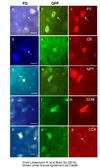Application Note
*Optimal dilutions/concentrations should be determined by the researcher.
| Application |
Recommended Dilution |
| 1:8,000-1:16,000 |
| 1:5,000-1:10,000 |
|
Note :
IHC-Fr
using methanol-fixed, frozen sections
|
Not tested in other applications.
Calculated MW
Positive Control
rat brain
Product Note
The antibody recognizes by ELISA, NPY (human), NPY (porcine), NPY (sheep), NPY (13-36), NPY (18-36), and cross-reacts with PYY (human). It does not cross-react with neurokinin B (NKB), neurokinin A (NKA), substance P (SP), calcitonin, somatostatin and BSA.
Form
Liquid
Buffer
Serum
Preservative
15mM Sodium azide
Storage
Store as concentrated solution. Centrifuge briefly prior to opening vial. For short-term storage (1-2 weeks), store at 4ºC. For long-term storage, aliquot and store at -20ºC or below. Avoid multiple freeze-thaw cycles.
Antigen Species
Pig
Immunogen
synthetic neuropeptide Y (NPY, porcine), conjugated to KLH. The corresponding sequence is highly conserved (single amino acid substitution) in human and rat NPY and is highly conserved (84% identity) in the C-terminus region (24-36) of human peptide YY.
Purification
Unpurified
Conjugation
Unconjugated
RRID
AB_381213
Note
For laboratory research use only. Not for any clinical, therapeutic, or diagnostic use in humans or animals. Not for animal or human consumption.
Purchasers shall not, and agree not to enable third parties to, analyze, copy, reverse engineer or otherwise attempt to determine the structure or sequence of the product.
Synonyms
neuropeptide Y , NPY02 , RATNPY , RATNPY02
Cellular Localization
Secreted
Background
NPY, a 36 amino acid peptide amide isolated from porcine brain, is a major regulatory neuropeptide in the mammalian central and peripheral nervous systems. NPY belongs to the pancreatic polypeptide family of peptides which are characterized by a common tertiary structure. Within this family, an intestinal peptide hormone, Peptide YY (PYY), is most closely related to NPY. In the central nervous system (CNS) NPY is considered to be involved in many central processes including regulation of blood pressure, memory processing, circadian rhythm, and stimulation of food intake. In the peripheral nervous system (PNS), NPY evokes potent vasoconstrictor activity and acts as a neurotransmitter/neuromodulator of sympathetic neurons and adrenal glands. NPY is one of the most abundant peptides found in the CNS. NPY and NPY mRNA are widely distributed in the brain. High levels of NPY are present in the cerebral cortex, amygdaloid nuclei, hippocampal formation, and hypothalamus. In the PNS, NPY is widely distributed in sympathetic neurons that innervate vascular smooth muscle, heart, and urogenital tract. In these neurons NPY is mainly co-localized with norepinephrine and is considered to function as a neurotransmitter to pre-synaptically inhibit nor adrenergic neurotransmission. The biological actions of NPY in the brain and periphery are mediated by at least two different NPY receptors, designated Y1 and Y2 receptor subtypes. Cardiovascular effects and centrally evoked food intake potential are activities predominantly mediated by the Y1 receptors, whereas the Y2 receptors, the major subtype in the CNS, are mainly involved in the pre-synaptic inhibition of neurotransmitter release and facilitation of memory retention. Post- synaptic NPY receptors are apparently of both the Y1 and Y2 type. NPY receptors are coupled to at least two different signal transduction mechanisms, the adenylate cyclase pathway (decrease in cAMP), and the phosphoinositol/IP3 pathway. Antibodies that react specifically with NPY are useful for the study of the mode of action, differential tissue expression, and intracellular and subcellular localization of NPY in the central and peripheral nervous systems.
Database
Research Area

